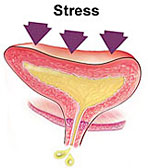
DIETARY ADVICE FOR PEOPLE WITH KIDNEY STONES The following guidelines can help to reduce/prevent the formation of kidney stones: Drink plenty Drinking fluids will reduce the risk of developing stones. • Drink plenty of fluids (preferably water) throughout the day. • Aim to drink 3 litres (about 15 glasses) each day so that you can…

What is the prostate? The prostate is a gland located in the lower urinary tract, under the bladder and around the urethra (Fig. 1). Only men have a prostate. It produces the fluid which carries semen. The prostate has smooth muscles which help to push out the semen during ejaculation. A healthy prostate is about…

Basic facts everyone should know: Kidney stones are among the most common—and painful—disorders of the urinary tract. Each year, thousands of Americans are diagnosed with kidney (renal) stone disease, a condition that develops when the urine becomes overly saturated with certain microscopic substances. They form crystals that eventually bind into hardened mineral deposits, known as…

What is stress urinary incontinence? Urinary incontinence is leaking of urine. It is not a disease but it is a symptom of many other health conditions, some surgery or even childbirth. More than 15 million Americans, mostly women, suffer from incontinence. Although it is more common in women over 60, it can occur at any…
What Causes Urinary Incontinence? Urinary incontinence is not a disease. It is a symptom of a wide range of conditions. These may include diabetes, stroke, multiple sclerosis, Parkinson’s disease, some surgeries or even childbirth or menopause* for women. Certain types of medications can cause or make incontinence worse. These medications include diuretics, sedatives, narcotics, antidepressants,…
What is stress urinary incontinence? Urinary incontinence is leaking of urine. It is not a disease, but it is a symptom of many other health conditions, and can occur after surgery. More than 15 million Americans suffer from incontinence. Although it is more common over 60, it can occur at any age. In general, more…